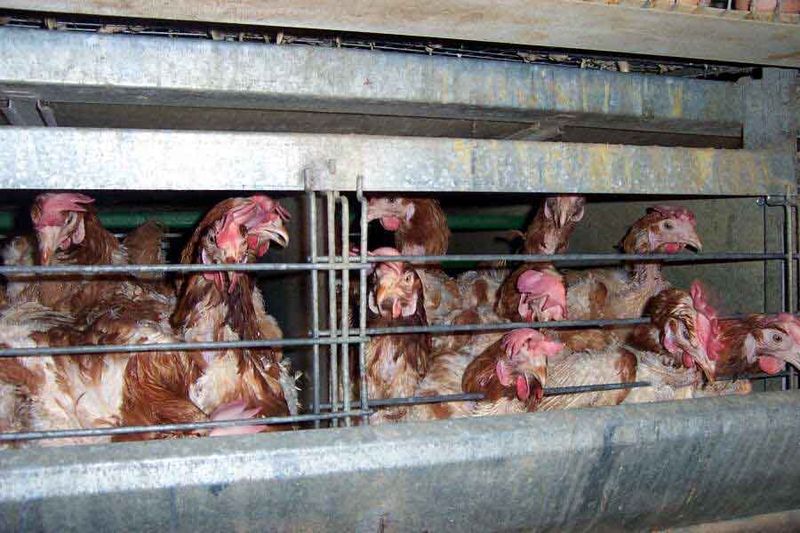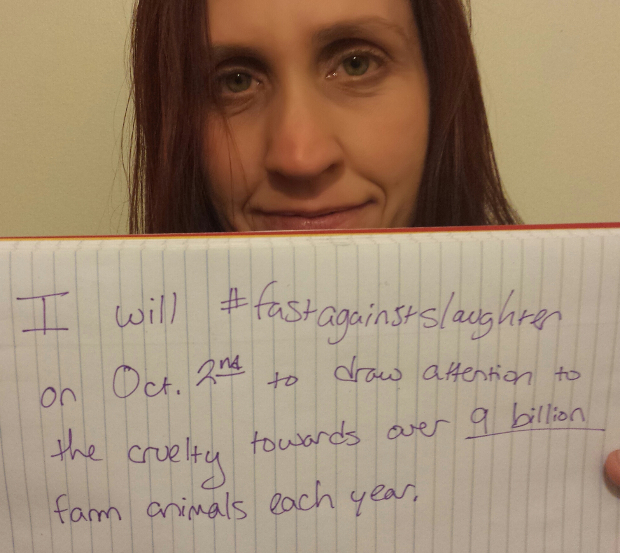As I noted yesterday, today is World Vegetarian Day, the annual kick-off to Vegetarian Awareness month. This is an excuse for vegetarians and vegans to continue to rave over veg food, and for non-vegetarians to hug and love on the veg folk in their life (as well as consider making a few veg meals part of your diet in the coming month). October is a great month for this, as (at least in the U.S.) fall harvests are rolling in, with plenty of pumpkin, apples, artichokes, brussels sprouts, leafy greens, potatoes, and winter squash available to adorn the table. There’s also some exciting veg-related stuff going on this month, including a Goat and Sheep Fundraiser on October 11th, and the Triangle Veg Fest on October 19th, both of which are sponsored by NC’s very-own Piedmont Farm Animal Refuge. I have yet to make it out to the refuge, but it’s on my list of to-dos.
Sooner that that, however, is the October 2nd “Fast Against Slaughter”, an event led by Alex Herschaft of the Farm Animal Rights Movement (FARM). I have to admit that when I first came-across this event, I was a bit skeptical at how effective such a campaign would be. I already abstain from consuming animals, which makes a tiny dent in the number of animals slaughtered each year for food (in general, over 9 billion animals are slaughtered each year, and that’s in the United States alone). For me, that’s a staggering number. I also wondered, in contemplating the fast, how physically fasting would actually help any additional animals on that day. In the past, I’ve generally taken on fasts in the context of spiritual growth (I don’t believe in fasts for “detoxification” or health). I personally believe that fasting can be a way to re-center yourself with the world, so to speak – abstaining from food for a day will lead you to identify with and develop compassion for the humans and animals on this planet who are consistently hungry.
FARM’s approach is centered around the works of Mahatma Gandhi (October 2nd is Gandhi’s birthday). Gandhi used fasting as a form of peaceful political protest; his fasting drew public attention to civil rights abuses around the world and was successfully used to promote anti-violence efforts. In this context, a Fast Against Slaughter is intended to draw attention to the fact that billions of animals are not only slaughtered each year for food, but that the majority of them are subject to egregious cruelty throughout their lives. FARM notes that food (and often water) is withheld from many animals in their transport to slaughter, which can include days on the road. These animals are already overcrowded into trucks and subjected to the high stress of being unable to move, forced to stand in their own feces and urine (or in the case of birds, are stacked such that they defecate on top of one another), and can endure extreme weather conditions, such as extreme heat in summer or negative windchills in winter. As such, many animals die during transportation.
Therefore, although a physical fast in and of itself does not save an animal from harm (unless you were planning to have meat for lunch), the public pronouncement of adopting a fast and drawing attention to what it stands for can provide visibility for issues that are often overlooked or ignored. For myself, I was led to participate in the fast in part because of my horror at the process of forced molting, which remains legal in the United States, despite much public outcry. As a bit of background, you should be aware that chickens and turkeys are not covered under the U.S. Animal Welfare Act or the Humane Slaughter Act. Whereas pigs, cows, and other land animals are provided paltry provisions under these laws, literally anything can be down to chickens and turkeys – many of these animals are simply ripped apart as they are pulled out of cages for slaughter, and high processing line speeds mean that many of these beautiful birds are not properly stunned and may remain conscious even as they are dropped into boiling water to remove their feathers. (It is sad to point out that earlier this year, the USDA recommended increasing these line speeds – despite the fact that to do so would increase these instances, as well as prove harmful for workers.) Even before the slaughterhouse, however, chickens – whether raised for meat or eggs – may be subjected to cruelties that are deemed “more efficient” for the industry. The one I find that most pertains to tomorrow’s fast, however, is forced molting.
Forced molting is a practice that actually applies to battery hens, which, when “spent” (their egg production has decreased to the point where it is not profitable to continue feeding them), are sent to slaughter. Their flesh is considered tough and bottom-of-the-barrel, but it frequently becomes a part of cheap frozen and processed foods, as well as part of the national school lunch program. Battery hens are bred to lay more than 275 eggs per year (hens naturally lay 20-30). As they age, they produce less eggs. In order to maximize profits, many farms will manipulate the hens’ environment to push the birds to lay one last big round of eggs before they go to slaughter. Naturally these birds would molt and replace all their feathers over the course of a year; most molting typically occurs at the beginning of winter, prior to the period when hens stop laying eggs. In order to induce this process in hens, the hens get a psychological shock to their system – all food is withdrawn, for anywhere from 5 to 21 days, while the lighting pattern is adjusted to simulate shorter days and longer nights. Of course, some hens die in during this period of starvation, which is considered a natural loss for the industry.

Battery Farm Hens. Image from: Wikipedia Commons
Few of us, I think, if we were raising chickens, would choose to withhold food from a creature for such an extended length of time. It is notable that this practice is banned in other countries, but not in the United States.
I would be remiss if I didn’t mention that thanks to the work of activists (particularly United Poultry Concerns) to bring awareness to this practice, there have been some improvements in the industry over the year. By putting pressure on the fast food industry, for instance, giants such as McDonalds and Burger King no long accept eggs from farms that practice forced molting, which has reduced the use of this practice. Other producers have simply modified the practice – instead of completely withholding food, they only severely reduce rations or provide a ratio that is significantly nutrient-deficient (so as to still achieve the desired results). Regardless, the practice of withholding food is still perfectly legal and in use by certain producers. Note that “cage-free”, “free-range”, “free-roaming”, or “pasture-raised”, and “certified organic” eggs all allow for the use of forced molting.
Forced molting is not the only sign of our lack of compassion towards factory-farmed chickens. There is the issue of debeaking, which removes the sensitive end of the bird’s beak to prevent pecking, the horrifying cramped conditions of battery cages, as well as the well-known practice of disposing of baby male chicks (which are unprofitable to egg producers) through either suffocation, gassing, or grinding.
I realize these are not pretty things to talk about – this does not even scratch the surface, however. The Humane Society of the United States (HSUS) has additional information on the issues with raising hens for eggs and raising chickens for meat if you’re interested in following up. That said, other farm animals – including cows, pigs, geese, turkeys, sheep, and ducks – are subject to equally abhorrent abuses, especially those raised in a factory farm setting.
For the reasons detailed above, I believe it is worth joining in the #FastAgainstSlaughter on Oct. 2nd. Going without food for a day is nothing when one considers what these animals face. Although I don’t expect anyone to join me, I do hope that you will think about these issues, and consider what compassionate choices can be made to improve the lives of animals. ♥

